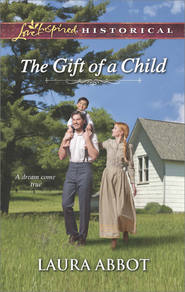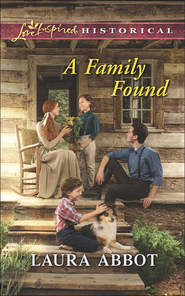По всем вопросам обращайтесь на: info@litportal.ru
(©) 2003-2024.
✖
A Letter for Annie
Автор
Год написания книги
2019
Настройки чтения
Размер шрифта
Высота строк
Поля
She brooded, unaware of the passage of time. When the front door opened, she started. “I’m back,” Annie called.
After putting away the groceries, Annie came into the living room. Her pallor highlighted the faint freckles running across the bridge of her nose and under her reddened eyes. “I think I’ll lie down,” she said. “Something must’ve disagreed with me. I’m a bit queasy. Can I get you anything before I go?”
What Geneva said aloud was “No.” What she was thinking was Child, you can get me the truth.
ANNIE BURROWED into the folds of the downy comforter, overwhelmed by a storm of long-buried emotions. She had thought never to see 33 Kittiwake again, her happy home for six years. The summer before her seventh-grade year her mother had married George Palmer, president of the local bank. Before that, she and her mother had lived in a cramped bungalow near downtown where Liz Greer owned a gift shop. They had struggled on occasion, but even when times were good, her mother had never seemed satisfied. When she started dating George, all she could talk about was his country club membership, the fancy dining establishments where they ate and his elegant home in one of the best neighborhoods.
When George had proposed, Annie remembered feeling happy about having a new dad and the prospect of a beautiful room with a canopy bed, a horse of her own and all the clothes any girl could desire. Instinctively she had warmed to George’s smile, his fatherly hugs and the way he called her “sweetie.” On their wedding day, Annie stood proudly by her ecstatic mother. She had never seen Liz Greer so happy. Holding a bouquet redolent with the scent of lilies and listening to her mother promise to love, honor and obey, Annie finally believed in fairy-tale endings.
Whatever George wanted, her mother gladly supplied. Both Liz and George expected Annie to behave in a way that reflected favorably their standing in the community. However, no matter how hard she tried to live up to their expectations, there was always the lingering suspicion that she never quite satisfied them. Even so, she’d reveled in the affection George showered upon her.
Gradually, though, she began to see that her mother’s attention was almost totally fixed on George. He, on the other hand, doted on Annie and seemed more a parent than her own mother. Over time Annie began to question her mother’s love, and a hole opened in her heart, ever widening, until Pete came along.
She muffled her sob. It was too painful to remember him and his gentleness, his devotion. And to remember what she’d had to do to him. To herself.
Auntie G. had sent her Pete’s obituary. For two weeks she never left Nina’s house, paralyzed by grief and memory. Pete represented the only time in her life when she had known the meaning of love and the sacrifices it required. Auntie G. and Nina could talk all they wanted about “moving on,” but the truth was that when she abandoned Pete, she lost any chance of knowing enduring love.
Now Pete had been dead six years. Two years ago George had died of a heart attack. She had thought she’d escaped Eden Bay forever. Rolling over on her back, she stared at the ceiling, the water stain resembling a cracked heart.
Suddenly the room seemed suffocating. If she stayed here, images from the past would loom and her stomach might again revolt. Leaping up, she pulled on her old Nikes, grabbed a sweater and bolted down the stairs. Geneva assured her she would be fine if Annie left for a while.
She jogged down the drive toward the ocean. Breakers were rolling in, crashing against rocks, spilling on the sandy beach. The sun sparkled on the whitecaps, turning the foam to spun sugar. It was a beautiful day, she kept telling herself. She had to live in the moment. Anything else was too painful.
She stood for several minutes at the edge of the sea, letting its roar and rhythm soothe her. As she caught her breath and her heart rate slowed, she made up her mind. She was here. In Eden Bay. It was unreasonable to suppose she could hide indefinitely. She was an adult. It was time to begin acting like one.
Feeling better, she started off at a brisk walk, following the curve of the shore. Lost in her thoughts, she didn’t see the figure walking toward her, until the person said, in a shocked tone, “Annie? Annie Greer?”
The woman’s face was obscured by a broad-brimmed straw hat and sunglasses. But Annie knew the voice, and her heart plummeted. “Margaret?”
Slowly Pete’s older sister removed her sunglasses and then stood blocking Annie’s way. “My father told me you were back in town. I’m sorry about your aunt, but I hope to God you’re not staying long. You are not welcome in Eden Bay, not now, not ever.” She stepped around Annie, put on her sunglasses and strode off down the beach.
Annie remained glued to the spot, the words “not now, not ever” echoing above the thundering surf.
CHAPTER FOUR
MARGARET’S WORDS didn’t surprise Annie, but that didn’t make them any less hurtful. Walking back to the cottage, she reminded herself of her resolution. She wasn’t about to let the disapproval of other people interfere with her reason for being in Eden Bay. She was here to care for Geneva, and that was exactly what she was going to do.
Not that she could blame Margaret. Annie had never wanted to hurt Pete. But on that long-ago night and in the painful morning hours that followed, she’d had no choice. Giving up the dreams she and Pete had shared had taken every ounce of her strength and had left her hollow.
Auntie G. was right. She needed to face her demons. Yet the immediacy of her revulsion when she’d seen the Kittiwake house had scared her. She didn’t want to revisit the past, even as a means of healing. In Bisbee she had avoided the issue; here, it confronted her everywhere.
When she reached the cottage, Geneva was dozing in her chair, her veined hands resting on a stack of photographs in her lap. In repose, the crepelike skin on her face sagged and she looked every one of her eighty years. Her chest worked to pull in air, and with each exhalation, a ragged sigh escaped her lips. Annie smoothed back the wisps of hair on her forehead, and then went into the kitchen to make a fruit salad and warm some soup for supper.
“Annie?”
“I’m in the kitchen.” She lowered the heat on the stove and went into the living room.
“I must’ve dropped off. Did you have a nice walk?”
Erasing the image of Margaret’s stony face, Annie nodded.
“Could we eat in here on trays?”
“No problem.”
“After supper I want to give you more of the family history and it’s just easier to stay here to eat.”
The truth, but not the whole truth, Annie suspected. Each day, in increasingly obvious ways, her great-aunt was failing.
Famished from skipping lunch and walking on the beach, Annie wolfed down her supper. Geneva, on the other hand, moved fruit around on her plate before finally spearing a chunk of pineapple and eating it. She did better with the soup, but still left half a bowl untouched. “I’m finished,” she said, dabbing her lips with her napkin.
“Auntie G., you need to keep your strength up.”
“I’m trying. But who are we fooling? I’m not going to live forever.”
Annie seized the opening. “What have your doctors said?”
Geneva gazed directly into Annie’s eyes. “That I’m terminal. Complications from my weak lungs and congestive heart failure will ultimately make breathing nearly impossible and affect other systems.” She handed her tray to Annie. “That’s why we have to make the most of the time I have. Starting with tonight.”
In the kitchen, blinking back tears, Annie rinsed the dishes and quickly loaded them in the dishwasher. Nina had tried to warn her and she’d understood the seriousness of Geneva’s situation, but hearing the word terminal from her great-aunt made the prospect unavoidably real.
“Do you remember your grandfather at all?” Geneva asked when they were settled in the living room.
“I saw him only a few times. When Daddy died, he came to the funeral. He brought me a doll. But I never played with it. It reminded me too much of the day of the funeral and the way the house smelled sickeningly of flowers and macaroni and cheese.” Annie recalled looking up at her tall, slender grandfather with his gray hair and sad blue eyes. The man who had come not just to comfort her with a doll, but to bury his son.
Geneva stared into space before continuing. “When Caleb was born, I thought he’d been created solely for my entertainment. I was four and, from the beginning, mothered him. Summers here at the ocean were magical. I loved holding his little hand and leading him down to the beach for family picnics. As he grew older, he was a natural athlete who shared my zest for adventure. One day just before World War II we hiked so far down the beach we didn’t get home until nearly dark. Our mother was frantic.” She smiled at the memory, then was quiet for a moment, the hiss of the oxygen a reminder of how far removed she was from that time when she and her brother had romped at the shore.
She shuffled through the photographs, handing Annie one of a skinny young man in a swimsuit balancing on a rock, waves crashing around him, a delighted grin on his face. “He was such fun. He had a talent for friendships and a wicked sense of humor.”
“What about my grandmother?”
“Jody? Like Caleb, she thrived on seeing new places, trying new things. They were married in 1951 just after they graduated from college.” She sorted through the pictures until she found one of her brother in a white dinner jacket gazing adoringly at a dark-haired young woman with short, curly hair and a pixie-like grin. “Here they are. During the Korean War, Caleb joined the Marines. While he was overseas, Jody lived here in the cottage.”
“I never knew that.” Annie tried to picture the young woman living here alone, isolated, worrying about her husband.
“Practically the minute Caleb returned home, Jody got pregnant and nine months later, along came your father. Shortly after John’s birth, Caleb was hired by a New York City bank and they moved.”
“That explains why they didn’t often get to Oregon.”
“One reason.”
Something in Auntie G.’s tone grabbed Annie’s attention. “Another reason?”
“You may as well know. Caleb and Jody didn’t care much for your mother. They found her attractive enough, but, well, somewhat superficial. Not well suited to John.”
Annie wished she could defend her mother, instead of acknowledging the fairness of the judgment. “What about Daddy? Did he love her?”
“Yes, I think so. He did everything he could to please Liz.”











